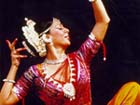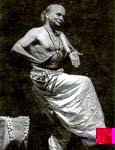Protima
Bedi is feared to be among the 202 people who
perished in Tuesday's tragic landslide in Uttar
Pradesh. Sandip Roy-Chowdhury
spoke to the hell-raiser-turned-Odissi icon recently.
A fascinating glimpse into the life and times of a
truly astonishing woman.
 Protima Gauri
Bedi is a grandmother now. But people still ask her
about streaking on Juhu Beach in Bombay nearly 30
years ago. The celebrated Odissi dancer and founder
of Bangalore's Nrityagram dance institute laughs,
"Everybody wants to know about it. Even now. But
look at what else I have accomplished since then
which must have taken courage. Far more than what it
took to streak. But because it's more immediate you
think you could even do this. But you can't build a
dance institute out of barren land."
Protima Gauri
Bedi is a grandmother now. But people still ask her
about streaking on Juhu Beach in Bombay nearly 30
years ago. The celebrated Odissi dancer and founder
of Bangalore's Nrityagram dance institute laughs,
"Everybody wants to know about it. Even now. But
look at what else I have accomplished since then
which must have taken courage. Far more than what it
took to streak. But because it's more immediate you
think you could even do this. But you can't build a
dance institute out of barren land."
Protima
Gauri made it a habit of doing the unexpected.
Nobody, least of all Bedi herself, ever thought she
would immerse herself in classical dance. After all
this was the bikini-clad go-go girl who had opened
Hideout, Bombay's first disco. But one day on her way
to a rock concert she wandered into the wrong theatre
and encountered Odissi. She recalls "When I saw
Odissi it could have been Kuchipudi or Thai for all I
cared. No one knew Odissi then. I S Johar once
introduced my performance saying 'Now for Protima
Bedi's Udipi performance.' But when I saw it I knew
that is what I wanted to do -- whatever it was. There
was something so sensuously spiritual about it. I
think I must have wanted that so much in my
life."
Protima
was then 26. She had already lived a full life. She
had been thrown out of schools, run away from home
with a film star and embarked on an open marriage
with him that was the talk of the cocktail circuit.
For
Protima rebellion started at home. "My first act
of major rebellion that my parents saw was my wanting
to work. Which was not OK. What did a Bengali bania
girl have to do when her father was rich enough to
give her whatever she wanted? And I said 'You don't
understand. I want to earn my own with my own
effort.' I decided that I was going to do modeling
which was a big no-no." Eventually her father
found out when one day he saw his daughter splashed
across the front page of The Times of India
modeling a nightie for Bombay Dyeing. He slapped her.
Protima,
who was already seeing actor Kabir Bedi and planning
to start a life on her own, ran away from home and
used her modeling money to rent a room. She was
forcibly taken back by the police. "But I was
over age and they couldn't really do anything. And I
ran off after three days again. My father died ten
days after that in a car crash. That was the only
time I felt I had done something wrong. He must have
been under a lot of stress. But I knew my motive was
not to hurt them. It was to free myself. In that
process they did not understand me and took the hurt.
Their hurt was really born out of the fear of public
opinion."
Having
set tongues wagging with the sensational elopement,
Protima now set them all afire with her much
publicised open marriage. But for her the open
marriage was not about shocking society. "My
mother was very frustrated, but she did not have the
courage to walk out. She blamed my father for the
fact that she couldn't do what she wanted to. I knew
the trap that my mother had put herself into was out
of her own choosing. I can't blame her completely. I
saw her environment. And I saw the marriages of my
parents' friends. There were rules for husbands. And
duties for wives.
"To
my analytical mind this relationship of marriage was
a very forced one between two people. I understood
that for the security and upbringing of the child the
parents need to be monogamous. Because then the child
will have a secure home. But both people should
understand and accept the fact that there would
always be temptation. That's not bad in itself
because what is temptation?
"You
are tempted to enjoy and express yourself. It doesn't
mean you hate the person you are with. It has nothing
to do with the other person. We wanted to break down
all the norms. We didn't know where we were going.
All we knew was that we were not going to go the same
way as my parents and no matter what pitfall we fell
into it was worth a try."
They
tried it for several years, but it did not quite
work.
"Human
nature being what it is, or at least conditioning
being what it is I was so insecure. I always had to
watch out for other women." She leans forward
and laughs "Because he was so damned good
looking, you know. When you are not the wife it's
great but when you are…"
Meanwhile,
many in their social circles took this talk of open
marriage as a green signal to make the moves on her.
'No!'
This whole thing about being a woman. You always feel
you are being treated a certain way. I cannot go out
on the street and buy myself a cigarette which is so
normal for a man to do. So how do you tell males how
difficult it is to do normal things as a woman? That
attitude had been building up. So I thought what is
it -- it's the body, it's the womanliness. That's all
it is. What about the woman inside? No one thinks
about the woman inside. So is this what they want?
Let them see what they want to." And she
streaked on the beaches of Juhu and sent Indian
society into a tizzy. What would that wild woman do
next?
Protima
would probably have not been able to answer that
question. Certainly she did not see herself with her
cigarettes, in torn jeans, with streaked hair begging
to learn a classical temple dance from Orissa.
"My guru said you are too old. I thought I was
young -- I was 26. And he said you can't and I said I
can. I'll show you. He said it will take many
sacrifices. And I said I'll give up anything you
want. I didn't realise I would have to give up my
family for that. I realise now if I had not gone for
three months to Orissa my husband would not have run
off with Parveen Babi. So it was really a giving up.
My children had to go to boarding school after that
-- there was no family. I had to give up my
lifestyle, my friends, my smoking, my drinking."
It
was not easy and eternal rebel that she was, she
chafed at the restrictions. "Firstly I had never
touched anyone's feet. So I refused to do that for
months. I had never been inside a temple. I refused
to go for puja every evening. I said I have
only come to learn dance. I don't have to do all
that. But the dance brought the devotion and the
spiritual understanding. I saw my guru's devotion
because everything he did was by example. If I have
built Nrityagram today it is because of what I took
from him.
 "This
great man (Guru Kelucharan Mahapatra, right),
a Padmashri and Padma Bhushan, would clean the gutter
outside his house. He used to beat me. One slap from
my dad and I had left the house. And my guru slapped
me a couple of times because I was arrogant. I would
be so angry I would pack my bags. But I knew I was
there because I wanted to be there not because he
wanted me to be there. And when I touched his feet it
was not by rote. When I touched his feet he and I
both cried because he had waited long enough for me
to come to that."
"This
great man (Guru Kelucharan Mahapatra, right),
a Padmashri and Padma Bhushan, would clean the gutter
outside his house. He used to beat me. One slap from
my dad and I had left the house. And my guru slapped
me a couple of times because I was arrogant. I would
be so angry I would pack my bags. But I knew I was
there because I wanted to be there not because he
wanted me to be there. And when I touched his feet it
was not by rote. When I touched his feet he and I
both cried because he had waited long enough for me
to come to that."
Protima
Bedi went on to dance all over the world. She settled
down in Switzerland with her Swiss lover. The world
was her stage but she started feeling this emptiness
inside. "I felt I had nothing more to learn. It
was the same thing wrapped up in different packaging
again and again. I am not a brilliant dancer at all.
But my packaging is great. You know, I have been a
hippie all my life. And the dreams of the sixties
that I had of living in a commune, of sharing, of
never having more than I can use, of living life
joyfully in nature -- that was the spirit that was
inside me. And in the isolation of being a dancer I
thought where is the giving, where is the sharing,
with me sitting so far in a cold place? I knew I had
to get back and I had to share what life had given me
through dance. I was willing to give up my dance and
work and beg to realise this dream. Because it would
still be my dream, it would still be dance but how
much joy it would give so many bodies."
 She
found a plot of barren land 30 miles outside
Bangalore and started Nrityagram. The purists were
shocked. They had just come to accept this hippie
girl from Bombay as a dancer -- after all she was
wearing a sari and putting a gajra in her
hair just like the other students. "But as soon
as I opened a dance school they went who does she
think she is? She has become a guru! In their mind
they could not accept that anyone could build a place
not because they want to be a guru but because they
want to give the best to a young bunch of girls. Guru
Kelucharan Mahapatra was in charge of Odissi.
Kalanidhi Narayan for Abhinaya. Kumudini Lakhia for
Kathak. Kalyani Kuttiyamma for Mohiniattam. The Paul
Taylor Dance Company did a workshop there. I was not
the guru. I was the slave. I was working with my
hands -- planting trees, digging the earth, typing,
collecting the money. I gave up my dance."
She
found a plot of barren land 30 miles outside
Bangalore and started Nrityagram. The purists were
shocked. They had just come to accept this hippie
girl from Bombay as a dancer -- after all she was
wearing a sari and putting a gajra in her
hair just like the other students. "But as soon
as I opened a dance school they went who does she
think she is? She has become a guru! In their mind
they could not accept that anyone could build a place
not because they want to be a guru but because they
want to give the best to a young bunch of girls. Guru
Kelucharan Mahapatra was in charge of Odissi.
Kalanidhi Narayan for Abhinaya. Kumudini Lakhia for
Kathak. Kalyani Kuttiyamma for Mohiniattam. The Paul
Taylor Dance Company did a workshop there. I was not
the guru. I was the slave. I was working with my
hands -- planting trees, digging the earth, typing,
collecting the money. I gave up my dance."
Students
started coming from all over India, from big cities
and little villages, many of them disobeying their
parents -- "a girl doesn't just go off. She gets
married and serves in this house or that house. She
is always serving in a house. That's why she is
called a housewife, not a manwife. If they dressed up
and danced in front of men, who would marry them? But
still these girls would come and say what does it
take for you to take us. And I would say it only
takes a train ticket to land here. Then I will look
into your eyes and I will know if you want to be here
for seven years or eight years. And in a month you
will know and I will know. For there are no malls
here, no shopping places, no transport -- only dance
and dance."
Embarking
on a new life Bedi decided to take a new name. In
Bangalore everyone called her Bedi-amma out
of respect, but they would all start giggling
whenever they said it. Eventually she figured out
that in Kannada, bedi meant loose bowel
motions. "I couldn't live the rest of my life
being called the mother of diarrhea," she
chortles. So she chose the name Gauri -- "it all
came back to my guruji saying 'bahut
kali-ka rup dekhaya tumne. (You have shown a lot
of Kali in you) Calm down a little bit. Parvati-ka
roop lo. (Take on the image of Parvati).'
Protima
Gauri put Nrityagram on the world dance map and then
almost as suddenly as she had created it out of
barren soil, she decided to move on. "My
creativity is over. Now it is only the question of
maintenance. I have empowered the girls to look after
themselves. To earn their own money, to be somebody.
I need to resuscitate. The land has to lie fallow for
the next crop. Whatever it is. I told the girls you
need to spread your wings and fly. They kept crying
and saying no you are deserting us. But I said my
children said the same thing. But they had their own
destinies. I don't want to control them. You want to
be controlled. When you are in the nursery you need
the shade. Now I must take the shade away so you can
find your own sun."
Protima
Gauri is at her favourite place these days -- at the
cross roads wondering which road to take. There are
reports that she is taking up the study of the Sama
Veda. Others swear she is taking sanyas.
After all she has shaved her head. "Everyone
thought it was another crazy idea of Gaurima's.
Everybody asked me why. I said I can give you many
reasons but none of them would be true. And yet all
of them would be true. And after I shaved my hair
everyone would start laughing and half way through
they would stop and said actually it kind of suits
you. It just means I can't dance any more. Obviously
for me dance as a solo dancer is over."
When
she quit Nrityagram, Gauri wanted to spend the rest
of her life looking after her son Siddarth who
suffered from schizophrenia. But Siddarth ended up
taking his own life. Gauri says gently "He gave
himself freedom from the pain he was suffering. He
did not want to live under medication using half his
faculties. And I think what a great mother I have
been to give him the courage to take such a decision.
He set me free. Tremendously free. You know he was my
only attachment. The monks in a monastery in Sikkim
said the child in my womb was an incarnate lama and
he was going to be called Siddarth but I had to give
him to the monastery. I said I can't make up his mind
for him. I will let him choose when he is old enough.
And I'll just take it that my son decided he was an
incarnate lama and he incarnated and that's all I can
say."
Protima
Gauri Bedi has spent her entire life fighting to be
free, to love and let go. It has not been an easy
lesson. When Kabir Bedi was living with Parveen Babi,
his mother would go to visit them. Protima was so
hurt she asked her 'Mom, the children are here. How
can you be there and not say anything to him?' And
she would say 'Darling I can't say what's right and
what's wrong. I can't. All I can do is to love you.
That's all I can do.' And it makes so much sense.
Because even though Kabir was with another woman all
I could do was love him. I couldn't say it was wrong
because that was what he wanted."
But
Kabir Bedi's mother was a Buddhist nun living in a
monastery. Protima Gauri was living in the midst of
society, running up against her conditioning at every
step. And sometimes the rules were being broken not
by her anymore but by her children. She remembers
when her 15-year-old daughter Pooja came home one
morning with a love bite on her neck. "I sat in
my chair and looked at her and said 'I am very
confused. Because I am feeling angry and I can't
understand why. I know at your age I was doing the
same thing and it seemed good to me and I knew I was
in control.
"So
why am I angry -- because you are a girl and a
daughter? Am I threatened that you are now a woman?
Am I envious of that? I need help here.' And Pooja
put her arms around my neck and said 'Mom it's ok.'
And it was. But I just needed to be honest about what
I was feeling. No one is perfect. I am a product of
my conditioning but I can question it. I don't have
to perpetuate it."
Now
Pooja Bedi has made Protima a grandmother. She
proudly shows me a picture of her brand-new
grandchild, beaming fondly. I wonder if this will be
her new attachment and ask how she will bless her
granddaughter. But she smiles and replies, "Just
as I would bless any person."
Then
she thinks and says, "Just be the best and the
highest expression of who you want to become. Be
that. Because if you are that there is no more
unhappiness. All frustration and anger comes from
being less. People say not everybody can be. But
everyone can be. I trust life. The only person who
stands in your way is yourself."
